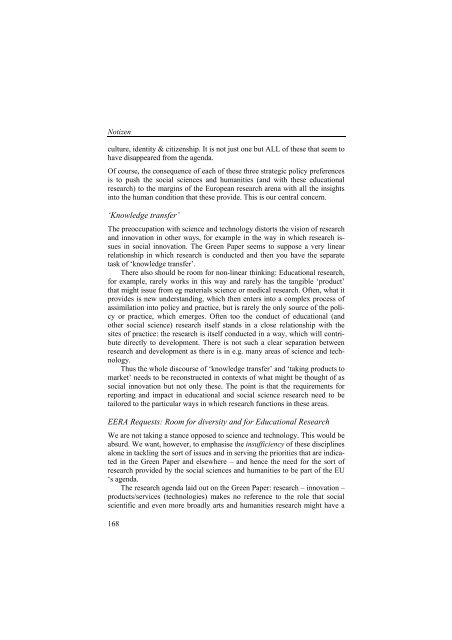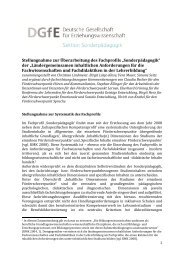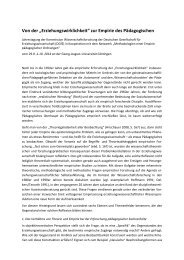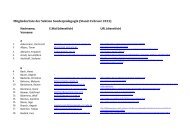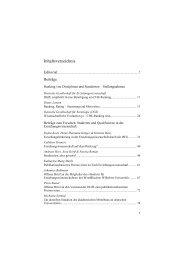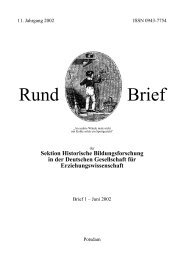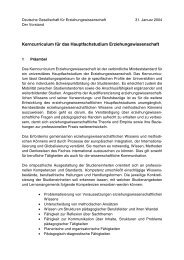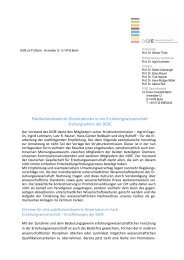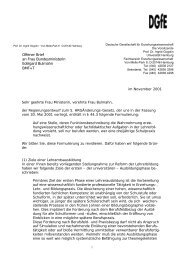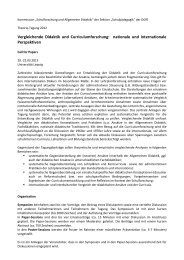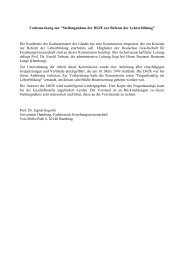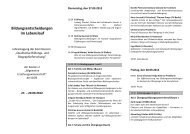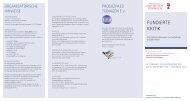Heft 43 - Deutsche Gesellschaft für Erziehungswissenschaft
Heft 43 - Deutsche Gesellschaft für Erziehungswissenschaft
Heft 43 - Deutsche Gesellschaft für Erziehungswissenschaft
Erfolgreiche ePaper selbst erstellen
Machen Sie aus Ihren PDF Publikationen ein blätterbares Flipbook mit unserer einzigartigen Google optimierten e-Paper Software.
Notizen<br />
culture, identity & citizenship. It is not just one but ALL of these that seem to<br />
have disappeared from the agenda.<br />
Of course, the consequence of each of these three strategic policy preferences<br />
is to push the social sciences and humanities (and with these educational<br />
research) to the margins of the European research arena with all the insights<br />
into the human condition that these provide. This is our central concern.<br />
‘Knowledge transfer’<br />
The preoccupation with science and technology distorts the vision of research<br />
and innovation in other ways, for example in the way in which research issues<br />
in social innovation. The Green Paper seems to suppose a very linear<br />
relationship in which research is conducted and then you have the separate<br />
task of ‘knowledge transfer’.<br />
There also should be room for non-linear thinking: Educational research,<br />
for example, rarely works in this way and rarely has the tangible ‘product’<br />
that might issue from eg materials science or medical research. Often, what it<br />
provides is new understanding, which then enters into a complex process of<br />
assimilation into policy and practice, but is rarely the only source of the policy<br />
or practice, which emerges. Often too the conduct of educational (and<br />
other social science) research itself stands in a close relationship with the<br />
sites of practice: the research is itself conducted in a way, which will contribute<br />
directly to development. There is not such a clear separation between<br />
research and development as there is in e.g. many areas of science and technology.<br />
Thus the whole discourse of ‘knowledge transfer’ and ‘taking products to<br />
market’ needs to be reconstructed in contexts of what might be thought of as<br />
social innovation but not only these. The point is that the requirements for<br />
reporting and impact in educational and social science research need to be<br />
tailored to the particular ways in which research functions in these areas.<br />
EERA Requests: Room for diversity and for Educational Research<br />
We are not taking a stance opposed to science and technology. This would be<br />
absurd. We want, however, to emphasise the insufficiency of these disciplines<br />
alone in tackling the sort of issues and in serving the priorities that are indicated<br />
in the Green Paper and elsewhere – and hence the need for the sort of<br />
research provided by the social sciences and humanities to be part of the EU<br />
‘s agenda.<br />
The research agenda laid out on the Green Paper: research – innovation –<br />
products/services (technologies) makes no reference to the role that social<br />
scientific and even more broadly arts and humanities research might have a<br />
168


